ASTANA — A citywide case championship organized by United Nations (UN) agencies and local partners at the Maqsut Narikbayev University on Nov. 25 marked the start of the global campaign, 16 Days of Activism Against Gender-Based Violence. Five teams representing Astana-based universities proposed innovative solutions to combat gender-based violence, addressing its societal and cultural roots.
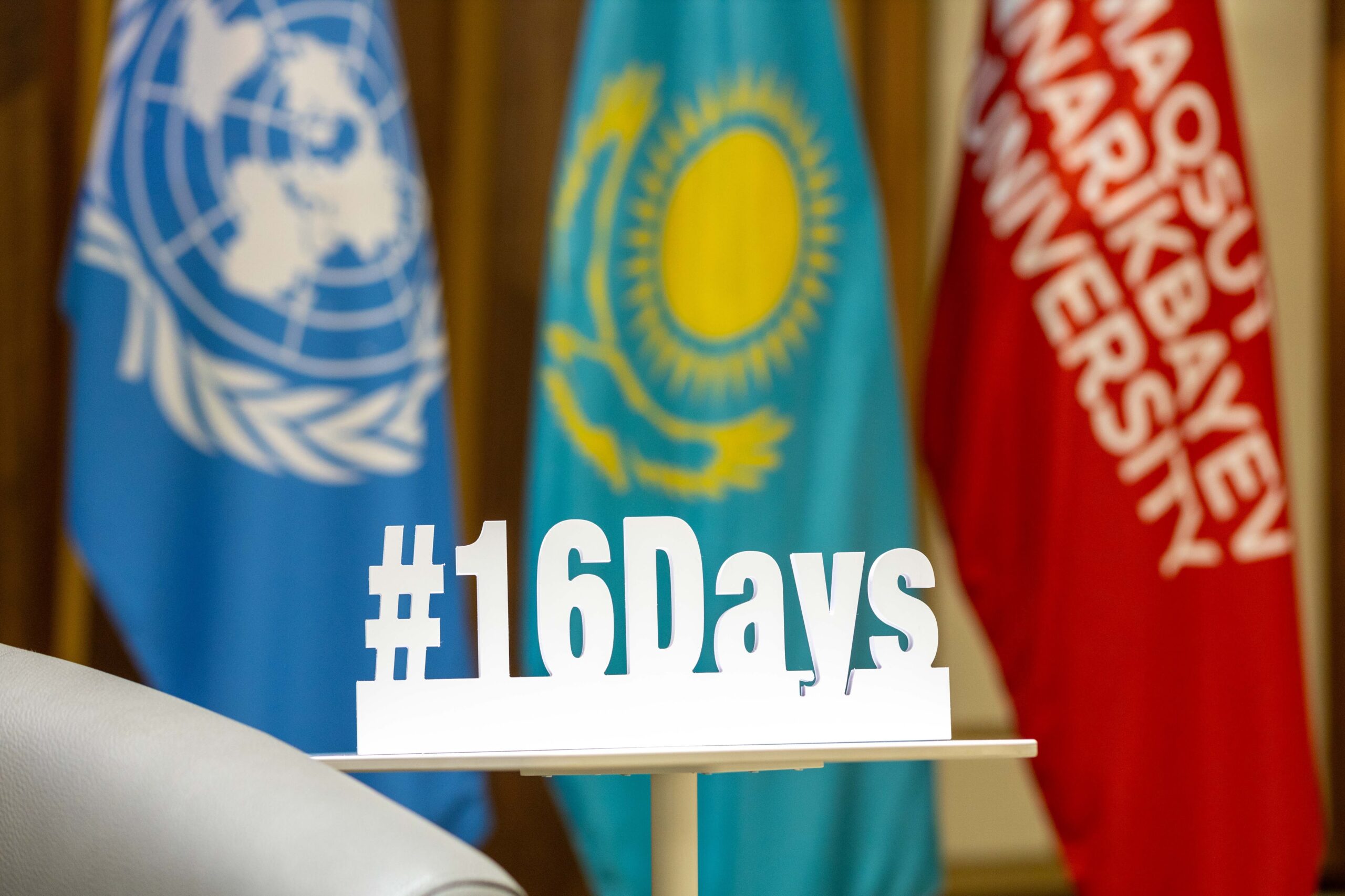
The 16 Days of Activism Against Gender-Based Violence campaign, symbolized by the color orange, runs through Dec. 10, Human Rights Day. Photo credit: WHO in Kazakhstan
“The participating students embody the energy, creativity and innovation needed to break the cycle of violence and foster a culture of respect and equality in society. Their contributions can challenge outdated norms, propose bold solutions and drive meaningful change. The 16 Days campaign is a call to recommit to the ideals of the Beijing Declaration and work tirelessly for a future free of violence,” said Stephen O’Malley, UN interim resident coordinator in Kazakhstan, opening the event.
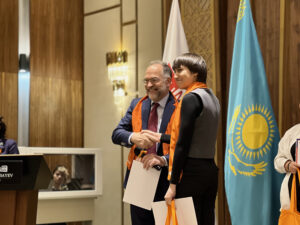
Stephen O’Malley, UN interim Resident Coordinator in Kazakhstan awards case championship participants on Nov.25. Photo credit: Nagima Abuova / The Astana Times
The event highlighted the critical role of youth in addressing this pervasive issue. According to Rashed Mustafa Sarwar, UN Children’s Fund (UNICEF) representative in Kazakhstan, gender-based violence impacts 17% of Kazakh women through physical abuse and 21% through psychological harm.
“This is one of the very few global events where the entire UN community comes together because it is a gender-based violence issue. (…) One important development of this event is the participation of young people proposing their own solutions. They are finding innovative ways to address this issue, as it is not just about physical and psychological abuse. It is also about lifelong trauma. That is why, as UNICEF, we believe we need to support mothers so that their trauma does not get transmitted to their children,” said Sarwar.
The participants analyzed real-life scenarios, exploring the multifaceted consequences of such violence, including economic, social and psychological effects. Solutions presented by students were evaluated on creativity, feasibility and alignment with societal and legal frameworks.
Innovative approaches and actionable solutions
The championship’s interactive format allowed students to demonstrate research, critical thinking and problem-solving skills. Teams of students from diverse majors, age groups and academic levels were tasked with analyzing a case study developed by UN agencies and presenting their proposed solutions.
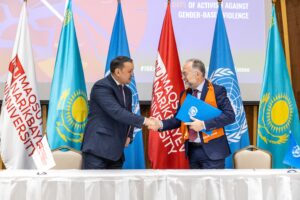
Talgat Narikbayev, Maqsut Narikbayev University’s chairman and Stephen O’Malley, UN interim Resident Coordinator in Kazakhstan sign a memorandum on cooperation to strengthen collaborative efforts. Photo credit: WHO in Kazakhstan
“Today’s case championship offers young leaders an opportunity to propose actionable solutions. Your ideas and energy can drive us toward a safer, more equitable society,” said Talgat Narikbayev, the university’s chairman.
During a lecture organized for students as part of the championship, Lyazzat Kaltayeva, chairwoman of the Legal Entities Association of the People with Disabilities of Almaty, emphasized the importance of everyday conversations about gender equality for achieving meaningful change.
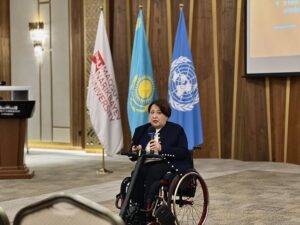
Lyazzat Kaltayeva, chairwoman of the Legal Entities Association of the People with Disabilities of Almaty. Photo credit: Nagima Abuova / The Astana Times
“We need to bring discussions of gender violence into our homes and families. Men should feel encouraged to care for children and women should be equally active in the workforce,” she said.
“I was very happy to see and hear that we have a generation growing up that is conscious and gender-sensitive,” she added.
Broader UN efforts: awareness and equality
Among the organizers are the UN Resident Coordinator’s Office, the UN Development Programme (UNDP), the UN Population Fund (UNFPA), UNICEF, the World Health Organization (WHO) and UN Women in partnership with Maqsut Narikbayev University.
The case championship complemented broader UN efforts to promote gender equality. In an interview with The Astana Times, Sukhrob Khojimatov, deputy resident representative of UNDP Kazakhstan, highlighted the need for behavioral change to eliminate harmful stereotypes.
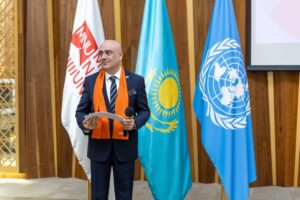
Sukhrob Khojimatov, deputy resident representative of UNDP Kazakhstan. Photo credit: WHO in Kazakhstan
“Men and women must see themselves as equals, moving beyond outdated roles like men as breadwinners and women as homemakers. The 21st century demands shared responsibilities, especially in a world increasingly driven by digitalization,” said Khojimatov.
When asked about the selection of a case championship format, Khojimatov noted that the idea stemmed from the youth community, facilitated by the UN’s Youth Advisory Board.
“The case championship was a natural choice, allowing young people to engage in research and learn about these pressing issues. It is about giving the next generation the tools and knowledge to take a stand against gender-based violence and contribute to a more equitable society,” he added.
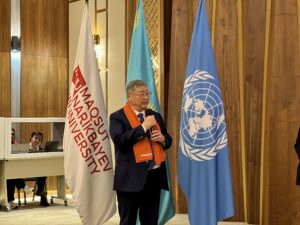
Raimbek Sissemaliyev, assistant representative of UNFPA. Photo credit: Nagima Abuova / The Astana Times
Raimbek Sissemaliyev, assistant representative of UNFPA, echoed these sentiments, noting that innovative ideas from participants ranged from legislative reforms to grassroots initiatives.
“Our survey revealed that one in four men in Kazakhstan believes child-rearing is solely a mother’s duty. We aim to shift this perspective, encouraging fathers to take an active role in family life. This involvement can significantly reduce gender-based violence by fostering equitable household dynamics,” Sissemaliyev told The Astana Times.
The campaign continues through Human Rights Day
The event concluded with the Maqsut Narikbayev University and UN Kazakhstan signing a memorandum of cooperation to strengthen their collaborative efforts.
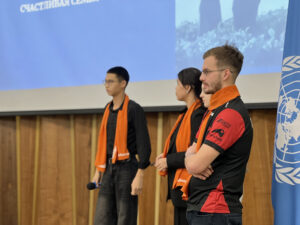
Case presentations made by students in Astana. Photo credit: Nagima Abuova / The Astana Times
The 16 Days of Activism Against Gender-Based Violence campaign, symbolized by the color orange, runs through Dec. 10, Human Rights Day. This year’s theme, under hashtag #NoExcuse, calls on global communities to unite against violence.
Alarmingly, one in three women worldwide experiences violence in their lifetime, and a woman dies due to femicide every 10 minutes. This annual campaign emphasizes the urgency of collective action, challenging societal norms and advocating for a future where violence against women and girls is no longer tolerated.
